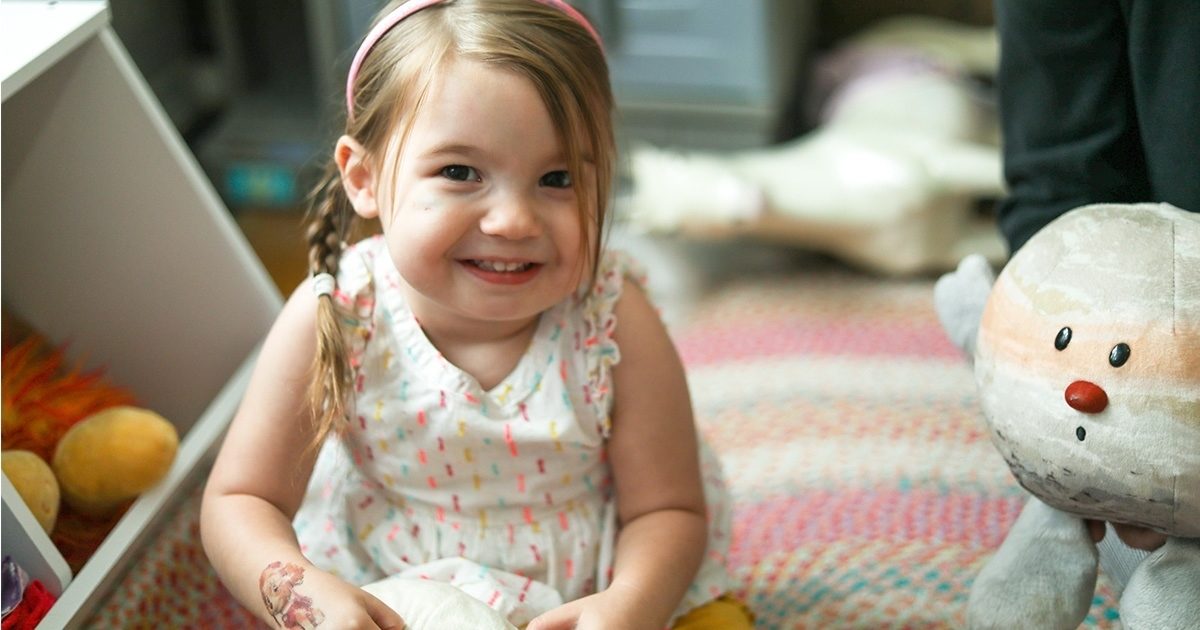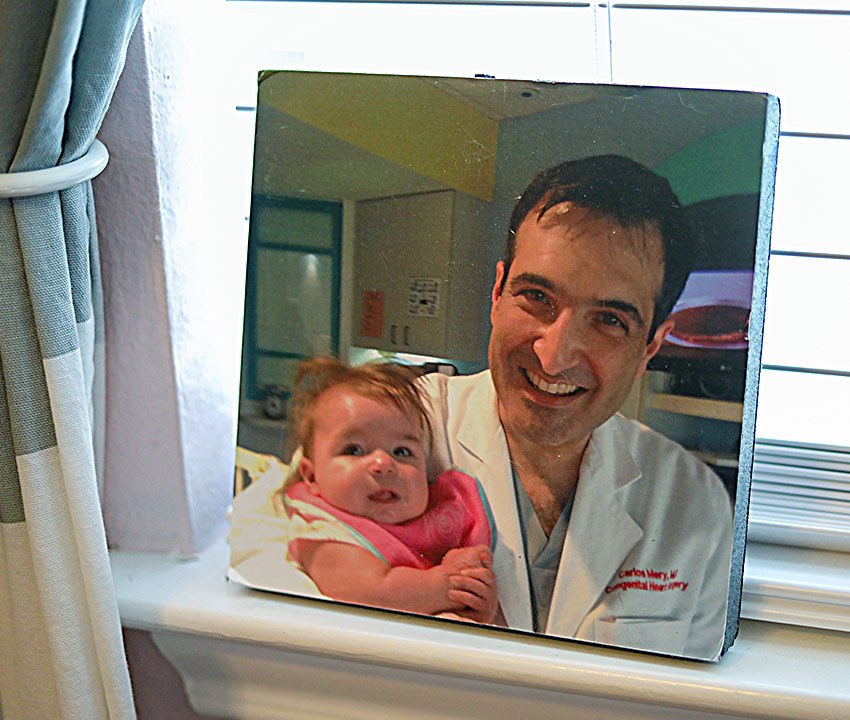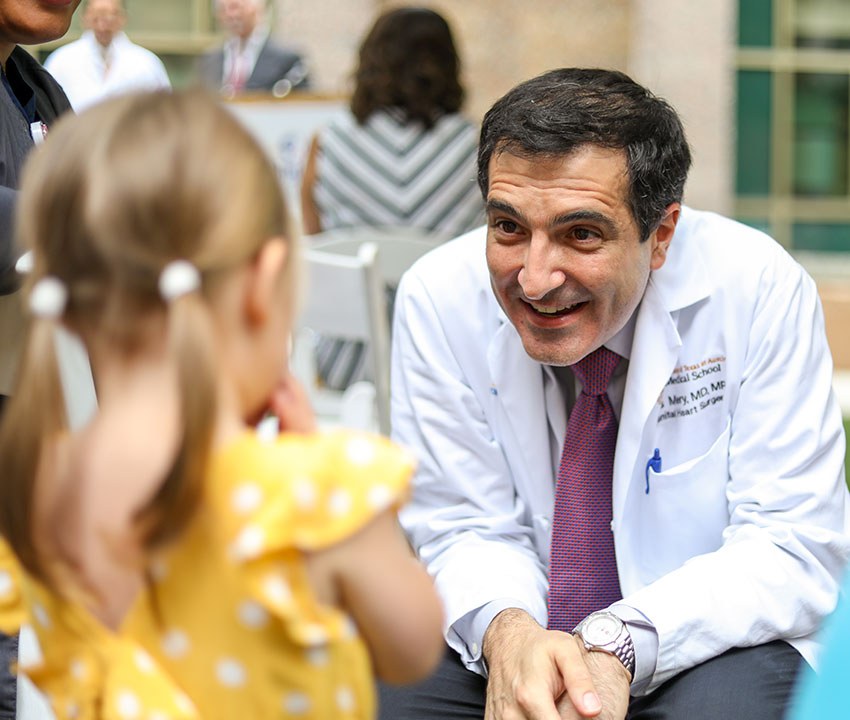A Move Worth Making
The story of one family’s decision to follow their surgeon as he moved to help start a new program in Austin, Texas
Written by: Lauryn Feil
Reviewed by: Patty, the patient's mother

As an expecting mom, the last thing you want to hear is that something is wrong with your unborn child. A few months before Patty was due to deliver her daughter, she received news that her unborn baby girl had a congenital heart defect that would need to be treated with open-heart surgery soon after she was born. Overwhelming information for any mother to hear. But as any soon-to-be mom would, she and her husband made plans to be seen by leading specialists in Texas to ensure proper treatment after their daughter was born.
After being connected with a cardiologist, Patty was reassured that it would likely be just one surgery to fix the defect and the chances her baby’s condition was worse than it appeared was less than one percent. But one percent is still one percent, and one day as Patty was putting together her daughter’s nursery she got a call from her cardiologist and was told that her daughter had something called heterotaxy syndrome. News, Patty says, that made her feel faint.
Heterotaxy syndrome is a very rare condition where the heart and other organs are not formed correctly or are in the wrong position in the body, which can cause a variety of very challenging health problems. As a result, Patty’s child would be born with many critical heart defects and would likely need several open-heart surgeries to repair. Patty and her husband wrestled with understanding the very likely possibility that they may only have a few days with their daughter after she gave birth.
Being Austin residents, at the time there were no programs in central Texas that treated congenital heart defects or conditions like heterotaxy syndrome. So, Patty and her husband were forced to travel outside of Austin for care. “We moved to Houston about a month before I was due in case I went into labor early and then once we found out she would need to stay in the hospital for a while, we rented an apartment and moved semi-permanently,” says Patty. She explains it was a “figure-it-out as we go” type of situation as everything happened so quickly.
Patty and her husband spent a total of nine months in Houston as their daughter, Addie, received ongoing care after she was born that included two open-heart surgeries (the Norwood and Glenn) and other procedures to manage the defects caused by her condition. Many families in the congenital heart defect community have faced similar situations when trying to find treatment for their child and have needed to relocate for care. In addition to managing the stress that surrounds the health of a child, a sudden move affects every aspect of life, including work, finances, routines, care/school for other children and more.
A need for an advanced pediatric cardiac care program in Austin was a given.

Led by Chief of Pediatric and Congenital Heart Surgery Charles Fraser, Jr., MD, the Texas Center for Pediatric and Congenital Heart Disease, a clinical partnership between UT Health Austin and Dell Children’s Medical Center was formed in August 2018. Dr. Fraser and his team had experience leading the number one pediatric congenital heart disease program in the country and were looking to build a leading program in Austin to serve the growing demand. Carlos Mery, MD, MPH, Addie’s surgeon in Houston, was part of the team that relocated to Austin.
“I was really excited when I found out Dr. Mery was moving here to Austin,” says Patty, “But then I realized I was faced with the decision to follow Addie’s surgeon or to stay with the already established program she had been receiving care with for the past two years.”
Patty wasn’t the only parent who questioned whether or not to jump into care with the new program at Dell Children’s. Other families were initially unsure about whether or not the new program would measure up to its established counterparts in Houston and Dallas.
“I talked to a lot of people in the medical community about what was more important, her surgeon, or the program,” says Patty. “Ultimately, because Addie’s condition is so complicated, I wanted someone who already knew her case really well. Dr. Mery has spent so much time studying Addie’s case that if you asked him to draw out her heart right now he would be able to do it and I felt like that would be hard to hand off to someone new. Dr. Mery had already operated on Addie twice, so I felt confident that sticking with him was the best choice.”

Patty and her husband decided to give the new program a shot for Addie’s third surgery (the Fontan) and they weren’t disappointed. “We were so happy that we followed the program and Dr. Mery here to Austin,” she says. Patty explained she had access to everyone on Addie’s care team, something she hadn’t had previously, and she felt like decisions regarding Addie’s care were made with her not for her.
Patty also noticed that even the nurses and support staff who attended to Addie remained the same throughout the 27 day hospital stay Addie had after her surgery. “I rarely saw the same nurses in Houston, so even though that may seem like such a small thing, not having to re-explain what was happening regarding my daughter’s health, really made a difference,” says Patty. They had access to toys, therapy animals, child-development specialists and more, all designed to enhance the patient’s overall recovery process.
When you meet Addie today, she’s a happy, little two-year-old, full of laughter and smiles, bursting with energy, and eager to show you her favorite toys. And while Addie’s case may not be typical, no pediatric congenital heart case ever is. Thus the importance of a having highly specialized and fully integrated cardiac team that is accessible to everyone in central Texas. Every single member of the team is trained to treat patients and their families with these types of conditions. Even the hospital and room design has changed to enhance health outcomes.
“I’m mindful not to take this program here for granted and I see that they are doing something great for this community,” says Patty. “For families who may still be unsure, I’d encourage them to get a second opinion and to go see how great it is for themselves. I have no doubt the program will continue to be a success and I can only see more positive changes coming for the healthcare environment in Austin.”
For more about Addie and her story you can visit the Heart Families website here.
For more information about the Texas Center for Pediatric and Congenital Heart Disease or to request an appointment at Dell Children’s Medical Center please visit here or call 1-855-324-0091.